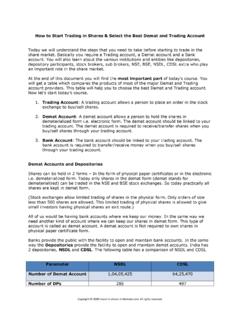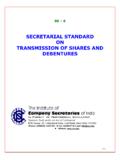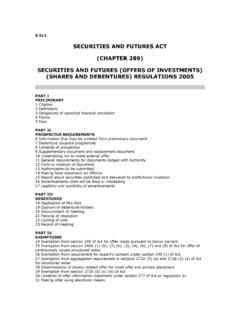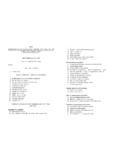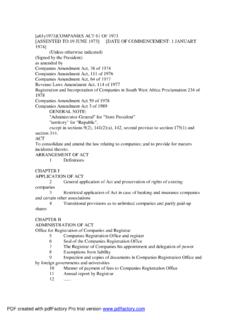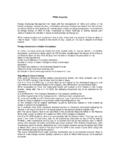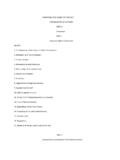Transcription of How to Start Trading in Shares & Select the Best …
1 How to Start Trading in Shares & Select the Best Demat and Trading Account Today we will understand the steps that you need to take before starting to trade in the share market. Basically you require a Trading account, a Demat account and a Bank account. You will also learn about the various institutions and entities like depositories, depository participants, stock brokers, sub brokers, NSE, BSE, NSDL, CDSL extra who play an important role in the share market. At the end of this document you will find the most important part of today's course. You will get a table which compares the products of most of the major Demat and Trading account providers. This table will help you to choose the best Demat and Trading account. Now let's Start today's course. 1. Trading Account: A Trading account allows a person to place an order in the stock exchange to buy/sell Shares .
2 2. Demat Account: A demat account allows a person to hold the Shares in dematerialized form electronic form. The demat account should be linked to your Trading account. The demat account is required to receive/transfer Shares when you buy/sell Shares through your Trading account. 3. Bank Account: The bank account should be linked to your Trading account. The bank account is required to transfer/receive money when you buy/sell Shares through your Trading account. Demat Accounts and Depositories Shares can be held in 2 forms In the form of physical paper certificates or in the electronic dematerialized form. Today only Shares in the demat form (demat stands for dematerialized) can be traded in the NSE and BSE stock exchanges. So today practically all Shares are kept in demat form.
3 (Stock exchanges allow limited Trading of Shares in the physical form. Only orders of size less than 500 Shares are allowed. This limited Trading of physical Shares is allowed to give small investors having physical Shares an exit route.). All of us would be having bank accounts where we keep our money. In the same way we need another kind of account where we can keep our Shares in demat form. This type of account is called as demat account. A demat account is Not required to own Shares in physical paper certificate form. Banks provide the public with the facility to open and maintain bank accounts. In the same way the Depositories provide the facility to open and maintain demat accounts. India has 2 depositories, NSDL and CDSL. The following table has a comparison of NSDL and CDSL.
4 Parameter NSDL CDSL. Number of Demat Account 1,04,05,425 64,25,470. Number of DPs 286 497. Copyright 2009 All rights reserved. Number of DP service 10,846 6469. centers Issuer Companies 7994 6510. registered Number of securities in 33, crores or 7,715 crores or custody 3,38,013 millions 77,150 millions Value of securities in 4,861, crore rupees or 845,080 crore rupees or custody 48,615,316 million rupees 8,450,800 million rupees Opening a Demat Account NSDL and CDSL are huge organizations and they have issued over crore (16 million). demat accounts. So a common investor like us does not directly contact the depositories to create a demat account. The depositories have agents called as Depository Participants, commonly referred as DPs. We interact with the DPs to get our demat accounts.
5 To open a demat account we will have to fill up the required Account opening forms given by the DP. Usually the following documents will also be needed by the DP to open a Demat account. Proof of Identification Proof of Address PAN card copy A cancelled check Recent photographs Facilities that you get in a Demat Accounts Demat accounts have many useful facilities which make it very easy for you to invest or trade in securities. These facilities are: 1. Holding securities in secure electronic form ( Demat form): Earlier Shares /securities were held in the form of Physical paper certificates. In this case there was always a danger of losing or damaging the paper certificates. In case of Demat accounts the Shares are held securely in electronic form by the Depositories. Thus there is no fear of losing or damaging the share certificates.
6 2. Single Consolidated Account for all Debt and Equity holdings: Earlier the investors had to manage each of their investments separately. This meant that they had to communicate with many companies and organizations to track and manage their investments. The Demat account allows them to hold all their investments in Shares , bonds, debentures, mutual funds etc under a single account. They need to interact with only a single organization the Depository to track and manage their investments. 3. Easy, fast and low cost Transfer of securities: After a share is traded, it needs to be transferred from the seller's account to the buyer's account. It took many weeks to transfer Shares in the paper certificate form from the seller to the buyer. Demat accounts reduce the paper work, time, effort and cost required in transferring securities.
7 It transfers the Shares in just 2 days. Copyright 2009 All rights reserved. 4. Easy and fast Implementation of Corporate Actions: Corporate actions are benefits given by companies to their share holders. Examples of Corporate actions are dividends, issuing bonus Shares , share splits extra. Demat Accounts make the implementation (distribution) of corporate actions faster and more convenient for both the shareholders and the issuing company. 5. Dematerialization: Demat Accounts allow share holders to convert their Shares in the physical paper certificate form into electronic form. This process is called as Dematerialization. 6. Rematerialization: Demat Accounts allow share holders to convert their Shares in electronic form back into physical paper certificate form. This process is called as Rematerialization.
8 7. Pledging: Shares or Debt securities held in a Demat account can be mortgaged to take loans. This facility is called as pledging. 8. Nomination: Demat accounts provide the facility to make a nomination. If the sole holder or all the joint holders of a demat account are deceased (dead), then the Shares held under that demat account will be given to the nominated person. 9. Transmission: When a person dies, the ownership of his Shares needs to be transferred to his legal heir/s. Transmission is the lawful process by which the ownership of securities ( Shares , bonds etc) is transferred to the legal heir/s of the deceased person. Demat accounts make transmission an easier and faster process. In this case the heir(s). do not have to separately contact many companies and organizations.
9 The just need to contact 1 entity the DP which managed the demat account of the deceased person. Stock Exchange The Depositories provide us with the facility to hold Shares in a secure and efficient manner. However one more important facility is required for the share market to work efficiently. We need a system which allows the millions of investors/traders to come together simultaneously and trade in secure and efficient manner. This facility is provided by the stock exchange. A stock exchange provides the facility to buy and sell securities like Shares , derivatives ( futures, options), debt instruments ( corporate bonds, government bonds) etc. In India there are 2 major stock exchanges - NSE and BSE. The following table has a comparison of BSE and NSE. Parameter NSE BSE.
10 Key fact India's largest stock Asia's oldest stock exchange exchange Location Mumbai Mumbai Established in 1994 1875. Number of members 1227 962. Number of listed 1432 4955. companies Copyright 2009 All rights reserved. Geographical spread Presence in 1,486 cities 330. Main Index S & P CNX Nifty BSE Sensex Stock brokers and Sub-brokers Only the members of a stock exchange are allowed to buy or sell securities in that stock exchange. These members are also called as Stock brokers, brokers or Trading members. To become a stock broker in a stock exchange the applicant needs to meet certain eligibility criteria and pay large deposits and fees. Most stock brokers directly deal only with big investors. Stock brokers have agents known as sub-brokers who interact directly with the common investors.
